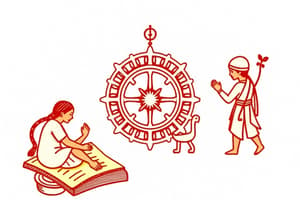Podcast
Questions and Answers
What is the difference between pratyakṣa jñāna and parokṣa jñāna in Jaina philosophy?
What is the difference between pratyakṣa jñāna and parokṣa jñāna in Jaina philosophy?
- Pratyakṣa jñāna focuses on collective knowledge, while parokṣa jñāna emphasizes individual experience.
- Pratyakṣa jñāna is mediated by the senses, while parokṣa jñāna is direct knowledge.
- Pratyakṣa jñāna refers to direct inner knowledge, while parokṣa jñāna represents knowledge mediated by senses. (correct)
- Pratyakṣa jñāna is abstract knowledge, while parokṣa jñāna is practical knowledge.
What is a key feature of the Indian knowledge tradition regarding truths?
What is a key feature of the Indian knowledge tradition regarding truths?
- It emphasizes a pluralistic approach acknowledging multiple truths. (correct)
- It rejects any form of ethical considerations in the pursuit of knowledge.
- It believes in a single authoritative source of knowledge.
- It promotes the idea of a singular and absolute truth.
What is the primary purpose of knowledge in the Indian knowledge system?
What is the primary purpose of knowledge in the Indian knowledge system?
- To achieve intellectual superiority over others.
- To simply accumulate material wealth.
- To reduce suffering and achieve Moksha. (correct)
- To promote the interests of a single community.
What does the concept of Ekatvabuddhi signify in the Indian knowledge tradition?
What does the concept of Ekatvabuddhi signify in the Indian knowledge tradition?
What type of knowledge requires a deeper process of preparation known as sādhanā?
What type of knowledge requires a deeper process of preparation known as sādhanā?
How does the Indian knowledge tradition view the relationship between knowledge and ethics?
How does the Indian knowledge tradition view the relationship between knowledge and ethics?
Which of the following descriptions aligns with the Indian knowledge tradition's approach to understanding reality?
Which of the following descriptions aligns with the Indian knowledge tradition's approach to understanding reality?
What aspect of knowledge is primarily encouraged in the Indian philosophy regarding individual and collective endeavors?
What aspect of knowledge is primarily encouraged in the Indian philosophy regarding individual and collective endeavors?
What was the primary role of education in ancient Indian society regarding cultural heritage?
What was the primary role of education in ancient Indian society regarding cultural heritage?
Which sacred texts were central to the teachings imparted through ancient Indian education?
Which sacred texts were central to the teachings imparted through ancient Indian education?
What ethical value was NOT typically instilled through ancient Indian education?
What ethical value was NOT typically instilled through ancient Indian education?
How did ancient Indian education contribute to social equality?
How did ancient Indian education contribute to social equality?
What was one aspect of personal development emphasized in ancient Indian education?
What was one aspect of personal development emphasized in ancient Indian education?
Which skill was cultivated through education for governance in ancient India?
Which skill was cultivated through education for governance in ancient India?
What practical skill was emphasized in ancient Indian education to promote economic prosperity?
What practical skill was emphasized in ancient Indian education to promote economic prosperity?
Which of the following was NOT a characteristic of educated rulers in ancient India?
Which of the following was NOT a characteristic of educated rulers in ancient India?
What was a key focus of education in ancient India?
What was a key focus of education in ancient India?
Which characteristic highlights the importance of individuality in ancient Indian education?
Which characteristic highlights the importance of individuality in ancient Indian education?
How did ancient Indian education contribute to societal harmony?
How did ancient Indian education contribute to societal harmony?
What role did spirituality play in the ancient Indian education system?
What role did spirituality play in the ancient Indian education system?
In what way did education in ancient India address the needs of individuals?
In what way did education in ancient India address the needs of individuals?
Which of the following was NOT a characteristic of the ancient Indian education system?
Which of the following was NOT a characteristic of the ancient Indian education system?
What aspect of the ancient Indian education system continues to influence contemporary society?
What aspect of the ancient Indian education system continues to influence contemporary society?
Which of the following best encapsulates the role of the arts in the ancient Indian education system?
Which of the following best encapsulates the role of the arts in the ancient Indian education system?
Which virtue was emphasized in the holistic development of students in ancient Indian education?
Which virtue was emphasized in the holistic development of students in ancient Indian education?
In the ancient Indian education system, the guru was primarily viewed as a:
In the ancient Indian education system, the guru was primarily viewed as a:
What does the term 'Guru Vandana' signify in the context of teacher-student relationships?
What does the term 'Guru Vandana' signify in the context of teacher-student relationships?
Which of the following best describes the nature of the relationship between a guru and a shishya?
Which of the following best describes the nature of the relationship between a guru and a shishya?
What aspect of education did the guru provide to students beyond academic subjects?
What aspect of education did the guru provide to students beyond academic subjects?
The bond between guru and shishya was meant to last:
The bond between guru and shishya was meant to last:
In the context of the ancient Indian education system, what was a key characteristic of the personal relationship between guru and shishya?
In the context of the ancient Indian education system, what was a key characteristic of the personal relationship between guru and shishya?
How was knowledge imparted from the guru to the shishya in ancient Indian education?
How was knowledge imparted from the guru to the shishya in ancient Indian education?
Who is known as the legendary compiler of the Vedas?
Who is known as the legendary compiler of the Vedas?
What was one of the primary qualifications required for teachers in the ancient Indian education system?
What was one of the primary qualifications required for teachers in the ancient Indian education system?
What is the significance of the mantra "Guru Brahma Gurur Vishnu Guru Devo Maheshwaraha"?
What is the significance of the mantra "Guru Brahma Gurur Vishnu Guru Devo Maheshwaraha"?
Which of the following was NOT a duty of students in the ancient Indian education system?
Which of the following was NOT a duty of students in the ancient Indian education system?
Which ancient figure is known for setting the standard for linguistic study through his work, "Ashtadhyayi"?
Which ancient figure is known for setting the standard for linguistic study through his work, "Ashtadhyayi"?
What element was emphasized in the character of students in terms of their dedication to learning?
What element was emphasized in the character of students in terms of their dedication to learning?
What aspect of education was encompassed by the role of Guru Seva?
What aspect of education was encompassed by the role of Guru Seva?
What was a key focus of the duties assigned to students in the ancient Indian educational framework?
What was a key focus of the duties assigned to students in the ancient Indian educational framework?
What was the primary purpose of Viharas and Mathas?
What was the primary purpose of Viharas and Mathas?
Which curriculum did ashramas primarily emphasize?
Which curriculum did ashramas primarily emphasize?
What role did temples and royal courts play in the education system?
What role did temples and royal courts play in the education system?
How did students typically sustain themselves while studying in ashramas?
How did students typically sustain themselves while studying in ashramas?
Who primarily sponsored educational initiatives in temples and royal courts?
Who primarily sponsored educational initiatives in temples and royal courts?
What was a distinctive feature of the instruction method in ashramas?
What was a distinctive feature of the instruction method in ashramas?
What was a key characteristic of household education?
What was a key characteristic of household education?
Which scriptures were primarily studied in ashramas?
Which scriptures were primarily studied in ashramas?
Flashcards
Observational knowledge (jñāna)
Observational knowledge (jñāna)
Knowledge gained through sensory experience.
Experiential knowledge (vijñāna)
Experiential knowledge (vijñāna)
Knowledge acquired through dedicated practice and inner exploration.
PratyakṣaJñāna
PratyakṣaJñāna
Direct, inner knowledge within oneself.
ParokṣaJñāna
ParokṣaJñāna
Signup and view all the flashcards
Plurality of Truths
Plurality of Truths
Signup and view all the flashcards
No Singular Authority
No Singular Authority
Signup and view all the flashcards
Knowledge of Oneness (Ekatvabuddhi)
Knowledge of Oneness (Ekatvabuddhi)
Signup and view all the flashcards
Ethical and Social Imperative (knowledge)
Ethical and Social Imperative (knowledge)
Signup and view all the flashcards
Ancient Indian Education
Ancient Indian Education
Signup and view all the flashcards
Scriptural Wisdom
Scriptural Wisdom
Signup and view all the flashcards
Social Cohesion
Social Cohesion
Signup and view all the flashcards
Ethical Values in Education
Ethical Values in Education
Signup and view all the flashcards
Spiritual Enlightenment
Spiritual Enlightenment
Signup and view all the flashcards
Leadership Skills
Leadership Skills
Signup and view all the flashcards
Economic Prosperity through Education
Economic Prosperity through Education
Signup and view all the flashcards
Good Governance
Good Governance
Signup and view all the flashcards
Holistic Approach in Ancient Indian Education
Holistic Approach in Ancient Indian Education
Signup and view all the flashcards
Spiritual Foundation of Education
Spiritual Foundation of Education
Signup and view all the flashcards
Integration of Knowledge
Integration of Knowledge
Signup and view all the flashcards
Development of the Whole Being
Development of the Whole Being
Signup and view all the flashcards
Ancient Indian Educational System Purpose
Ancient Indian Educational System Purpose
Signup and view all the flashcards
Ancient Indian Education's Legacy
Ancient Indian Education's Legacy
Signup and view all the flashcards
Cultural Preservation Through Education
Cultural Preservation Through Education
Signup and view all the flashcards
Spiritual Orientation in Education
Spiritual Orientation in Education
Signup and view all the flashcards
Viharas and Mathas
Viharas and Mathas
Signup and view all the flashcards
Ashramas
Ashramas
Signup and view all the flashcards
Temple and Royal Courts
Temple and Royal Courts
Signup and view all the flashcards
Monastic Education Emphasis
Monastic Education Emphasis
Signup and view all the flashcards
Ashram Instruction
Ashram Instruction
Signup and view all the flashcards
Household Education
Household Education
Signup and view all the flashcards
Centers of Learning
Centers of Learning
Signup and view all the flashcards
Royal Patronage
Royal Patronage
Signup and view all the flashcards
Ancient Indian Teachers
Ancient Indian Teachers
Signup and view all the flashcards
Sage Vyasa
Sage Vyasa
Signup and view all the flashcards
Guru's Instructions
Guru's Instructions
Signup and view all the flashcards
Guru Seva
Guru Seva
Signup and view all the flashcards
Student Duties (Brahmacharins)
Student Duties (Brahmacharins)
Signup and view all the flashcards
Regular Attendance
Regular Attendance
Signup and view all the flashcards
Focused Study
Focused Study
Signup and view all the flashcards
Memorization and Recitation
Memorization and Recitation
Signup and view all the flashcards
Virtues emphasized
Virtues emphasized
Signup and view all the flashcards
Guru-Shishya Parampara
Guru-Shishya Parampara
Signup and view all the flashcards
Guru's role
Guru's role
Signup and view all the flashcards
Lifelong Commitment
Lifelong Commitment
Signup and view all the flashcards
Guru Vandana
Guru Vandana
Signup and view all the flashcards
Holistic Guidance
Holistic Guidance
Signup and view all the flashcards
Learning from actions
Learning from actions
Signup and view all the flashcards
Study Notes
Indian Knowledge System
- Indian civilization has valued knowledge throughout history, evidenced by vast collections of texts and institutions.
- The Bhagavad Gita emphasizes the transformative power of knowledge as a purifier and liberator.
- The concept of jnana (knowledge) has been intrinsic throughout Indian thought.
- Three key terms—darshana, gyan, and vidya—are closely intertwined in discussions on knowledge.
- Darshana refers to philosophy as a guiding viewpoint, leading to gyan, which is gathering and organizing knowledge.
- Vidya represents the specific domain of knowledge for reflection and education.
- Knowledge is divided into Para Vidya (ultimate principle) and Apara Vidya (knowledge of the worldly domain).
- Indian traditions distinguish between sensory and experiential knowledge (jñāna and vijñāna).
- Jñāna is observational knowledge gained through the senses.
- Vijñāna is experiential knowledge gained through inner experiences.
- Indian knowledge is pluralistic, accepting multiple truths and diverse perspectives.
- There is a fundamental recognition of the oneness of all existence, integrating diverse viewpoints.
Ancient Indian Education System
- Ancient Indian education was deeply integrated with culture, society, and focused on holistic development.
- It emphasized not only academic knowledge, but also moral and spiritual growth.
- Education preserved cultural traditions, scriptures, and promoted social cohesion and harmony.
- The system promoted ethical values, equality, and spiritual development.
- Education provided practical skills and encouraged artistic expression.
- Education aimed at achieving enlightenment (moksha), personal transformation, and self-realization.
- Education was deeply interconnected with spirituality.
- Education was often through a residential system like Gurukula.
Characteristics of Ancient Indian Education
- Holistic approach encompassing intellectual, moral, spiritual, and practical dimensions.
- Strong emphasis on spiritual foundation, aiming for self-realization and enlightenment.
- Personalized instruction through the Guru-Shishya tradition.
- Residential learning in Gurukulas, immersing students in the daily life of the school.
- A diverse curriculum encompassing various subjects, including Vedic scriptures, philosophy, mathematics, arts, and practical skills.
- Merit-based access, regardless of caste or social background.
- Emphasis on oral traditions, memorization, and practical application.
- Fostering a culture of learning, inquiry, and spiritual growth.
Teacher-Student Relationship
- Deep mutual respect, trust, and devotion characterized the Guru-Shishya relationship.
- Gurus weren't just teachers but also mentors and spiritual guides.
- Students showed deep reverence and obedience to their gurus.
- The relationship extended beyond formal education, continuing throughout life.
- Gurus instilled moral, ethical, and spiritual values in students through their actions and teachings.
- Gurus nurtured students' individual strengths, ensuring their holistic development.
Qualifications of a Guru
- Mastery of subject matter, including Vedas and related texts
- Deep understanding of related scriptures
- Proficiency in Sanskrit
- Moral and ethical qualities
- Spiritual qualities
- Pedagogical skills and experience
- Deep knowledge and expertise in a particular area.
Studying That Suits You
Use AI to generate personalized quizzes and flashcards to suit your learning preferences.




